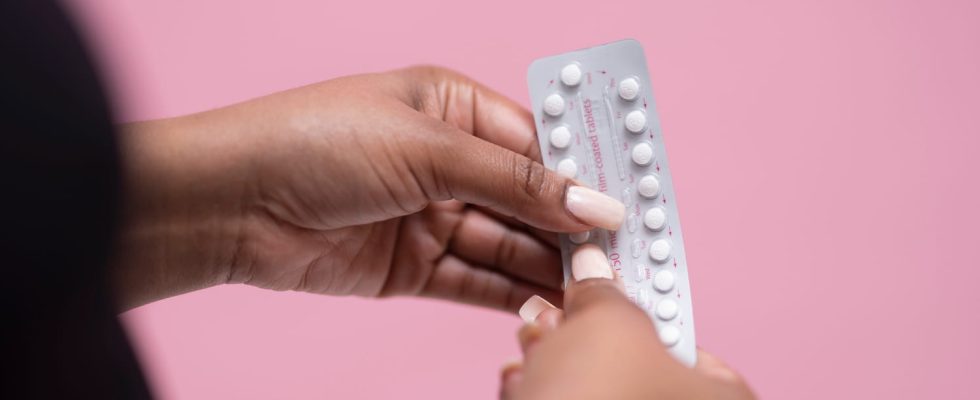Pill, implant, ring, IUD… It is not always easy to choose your first contraception during adolescence or at the start of your sex life. Here are our gynecologist’s advice to make an informed choice.
Who says first sexual intercourse ideally says first gynecological consultation and first contraception. But we still have to choose the one that suits us best according to our profile! So, IUD or pill? Contraceptive implant or vaginal ring? Estrogen-progestogen pill, 2nd or 3rd generation or progestogen micropill? Advice from Dr. Brigitte Raccah-Tebeka, gynecologist-endocrinologist.
If the girl has had her first sexual relations, or if she is planning to have one, she can consult a gynecologist and use her first contraception. She can decide, as she chooses, to consult a gynecologist (whom her general practitioner, her mother or a friend can advise her on) or to go to a family planning and education center (CPEF, Family Planning). But let her be reassured, “the first gynecological consultation does not necessarily involve a gynecological examination like a smear for example. It is only carried out if the patient is not hostile to it or if her state of health requires it.“, specifies Dr. Raccah-Tebeka. On the other hand, the gynecologist will always check, during this first session, his weight, blood pressure, appearance of his skin, condition of his legs (to detect possible venous problems) as well as the condition of her breasts via a palpation (to detect a possible ball, a flow…).
Then there is a real exchange between the health professional and the girl. “This first contact is an opportunity to ask her what she knows about contraception, if she has any friends who have spoken to her about it, what is her possible medical or family history (stroke, phlebitis, pulmonary embolism in her family close). Then comes the time to explain to him the different contraceptive possibilities.“, explains Dr. Raccah-Tebeka. Moreover, during the first gynecological consultation, the doctor will insist on the use of condoms to inform the girl about sexually transmitted infections. Finally, “no need to take a blood test before the first prescription, unless the girl is overweight (in this case, her blood sugar and cholesterol levels must be checked) or if she has a family history. On the other hand, it is necessary to make an appointment with your gynecologist and to make a blood test after 3 months on hormonal contraception to check if it is well tolerated by the body and if it does not cause side effects (chest pain, weight gain, bleeding, acne, migraines…)”.
Which contraception to start with?
► A hormonal contraceptive. “Generally, for a first contraception, it is extremely rare to offer a method without hormones such as the copper IUD or topical method“, indicates the gynecologist from the outset. The young girl will be advised to combine hormonal contraception. When taken correctly, the pill remains very effective (91% effectiveness in everyday life). However, d other hormonal contraceptives may be offered. vaginal rings and patches also have a good efficiency (around 90% in practical use) and help to avoid forgetting pills. However, they are not reimbursed by health insurance. The pill is easy to use, is completely reversible, regulates cycles and reduces menstrual pain. Some even have a positive effect on acne. The rules of use are then well explained as well as the attitude to adopt in case of forgetting. But why associate it with condoms? Because although high, the contraceptive effectiveness of the pill is still not sufficient in these young girls, for whom an unwanted pregnancy would be very problematic. And if, after a few months, the romantic relationship continues and if the young girl resorts to another birth control, we can invite the couple to give up the condom. But first, a screening test for sexually transmitted infections must be carried out by both partners.
► The contraceptive implant can also be considered as first-line contraception in young girls: this method remains effective for a period of 3 years and makes it possible to avoid forgetting the pill. On the other hand, “diaphragms and cervical caps are local contraceptives that are not offered to young girls. Their effectiveness is not sufficient (around 85%) for these women who have normal fertility. They will be offered more to women over 40 whose fertility has decreased“, recommends the expert.
What is the best first birth control pill?
Combined or estrogen-progestogen, progestogen, 2nd generation or other… There are so many different pills that it’s hard to see clearly. But don’t panic, the gynecologist is there to guide you according to your profile:
► If the girl has no personal or family history, has no cholesterol, diabetes or other contraindications, she is offered a so-called 2nd generation estrogen-progestogen pill (it contains levonorgestrel or norgestrel with a lower thromboembolic risk);
► If the young girl has a family or personal history (and therefore has a risk of pulmonary embolism, phlebitis, heart attack, cardiovascular accident, etc.), or health problems (high cholesterol, arterial hypertension,) which contraindicate the use of estrogens, we will orient it either towards a progestogen pillor to a contraceptive implant subcutaneous, a device containing only progestogen hormones which do not increase this risk;
► If the girl smokes less than 5 cigarettes a day and only has tobacco as a risk factor, there are no contraindications to using a estrogen-progestogen pill ;
► If the girl smokes more than 5 cigarettes a day and she has another risk factor (high cholesterol, overweight, high blood pressure, etc.), contraceptives containing estrogen should be avoided and rather prescribe a progestogen pill or one contraceptive implant ;
► If the girl has acne-prone skin, she will be offered a estrogen-progestogen pill which helps relieve acne. Namely that the progestogen contained in the progestogen pill, such as levonorgestrel, with effects similar to male hormones, can aggravate acne.
Thanks to Dr. Brigitte Raccah-Tebeka, gynecologist-endocrinologist.
